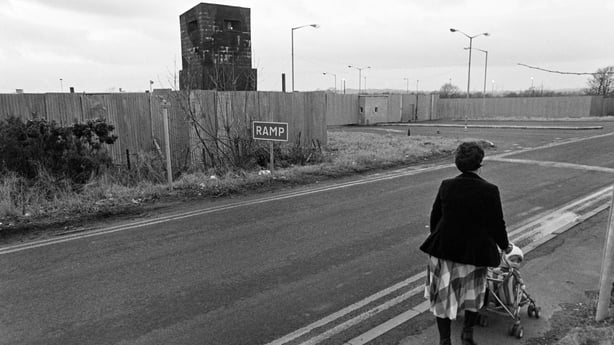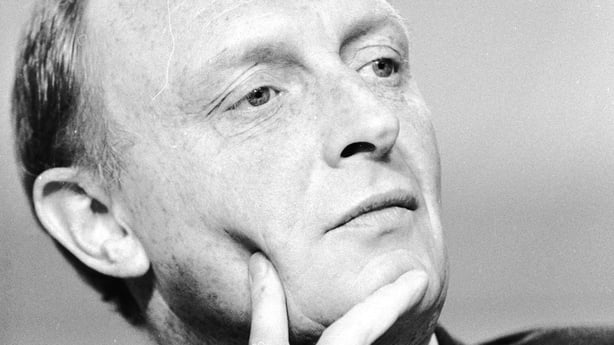Much of the focus on the history of the Good Friday Agreement has naturally been on the talks themselves. But newly released government documents cast new light on the fraught security situation outside Castle Buildings, and on the difficulty of winning the subsequent referendum - particularly because of politicians from outside trying to be helpful.
Before the deal was agreed, the Irish government was warned of the danger of major violence in Northern Ireland if the negotiations failed - or even if they succeeded.
Deputy leader of the Ulster Unionist Party, John Taylor, told London Embassy official Philip McDonagh in February 1998 that he feared "a huge intensification of violence and even something like civil war" if there wasn't progress in the talks.
Taylor claimed this was the message he and his party leader David Trimble had received when they visited the Maze to talk to loyalist prisoners - the "men with tattooed shoulders", as Taylor described them.

He said some of the loyalists said they would "leave no nationalist alive in Northern Ireland" and "mount attacks in Dublin". According to Taylor, he told them that "not all of us live in East Belfast. If you lived in Armagh, you’d know that in a civil war, we’re not sure to win".
But what if there was an agreement? A confidential British security briefing provided to local government officials at an army base in England claimed there was a serious potential loyalist security threat from April onwards in response to a political settlement.
According to embassy official McDonagh, the briefing discussed "a possible breakdown in law and order worse than that seen in Drumcree in 1996". The security officials were worried that the loyalists presented "a dangerous unknown quantity" as compared to the well-known pattern of republican violence.
McDonagh said the report of the briefing was reliable, though the people being briefed - sheriffs of counties - were not high-ranking and the security services were prone to exaggeration. But his informant took the view that the briefing suggested that prime minister Tony Blair and his government "have decided to 'face down’ the loyalist card".
Major violence was avoided - but there was still the problem of having the agreement ratified by a referendum in Northern Ireland (the simultaneous vote in the Republic was a foregone conclusion).
Northern secretary Mo Mowlam was worried that a visit by US president Bill Clinton during the campaign could annoy unionists and scupper the referendum.
In a conversation with Irish Ambassador to London Ted Barrington in April 1998, Mowlam complained that she was "inundated" with offers by outside politicians to help with the referendum campaign.

The leaders of the two British opposition parties - Tory William Hague and Liberal Democrat Paddy Ashdown - as well as former Labour leader Neil Kinnock had offered to come to Northern Ireland and were "difficult to refuse without offence". But, she said, "she had to consider feelings within Northern Ireland about outside interference".
Her biggest worry, however, was president Bill Clinton, who would be "difficult to keep out" if he wanted to come. She suggested that the best way of dealing with a visit would be to "keep him off the streets" by confining the visit to "community groups, factories and things like that".
In the event, Clinton decided not to travel, because Ulster Unionist leader David Trimble was said to be "reticent" about the idea.
The need to keep unionists on board was a big worry. The Northern Ireland Office carried out private polling and focus groups, which they shared with Irish colleagues, on the basis that the information would be kept secret.
Two weeks before polling, the research suggested that only 36% of unionists were in favour of the agreement, while 35% were against, with 29% undecided. Even more worryingly, over the previous week the "Don’t Knows" were moving in greater numbers to the "No" camp.
According to the research, "the single biggest negative factor impacting on unionist opinion remained the prisoner [release] issue. Many, especially those who were strongly religious, saw it in moral terms".
John Taylor confirmed the problem, telling Irish Embassy official Philip McDonagh that "the ground is slipping under our feet". If the agreement didn't get the backing of a majority of unionists, it would be impossible for Taylor and Trimble to work the Assembly. "We have stuck our necks out. We need help."
In particular, he asked the Irish government to give more clarity on the decommissioning of paramilitary weapons, and to state that Sinn Féin couldn’t serve in the executive without decommissioning.
McDonagh replied that while the Irish government was anxious for the republican movement to begin decommissioning, the agreement contained a timeframe of two years for this to take place.
Taylor didn’t disagree, but added bleakly: "That won’t help us between now and 22 May".
As it turned out, Taylor’s fears proved - just about - unfounded. In the referendum, the agreement was backed by 96% of nationalists and over 50% of unionists, a less than emphatic but sufficient basis for the process to continue.
By David McCullagh and Shane McElhatton
[Based on documents in 2022/45/58, 2022/45/96, 2022/45/422, 2022/45/423 and 2022/45/435]

